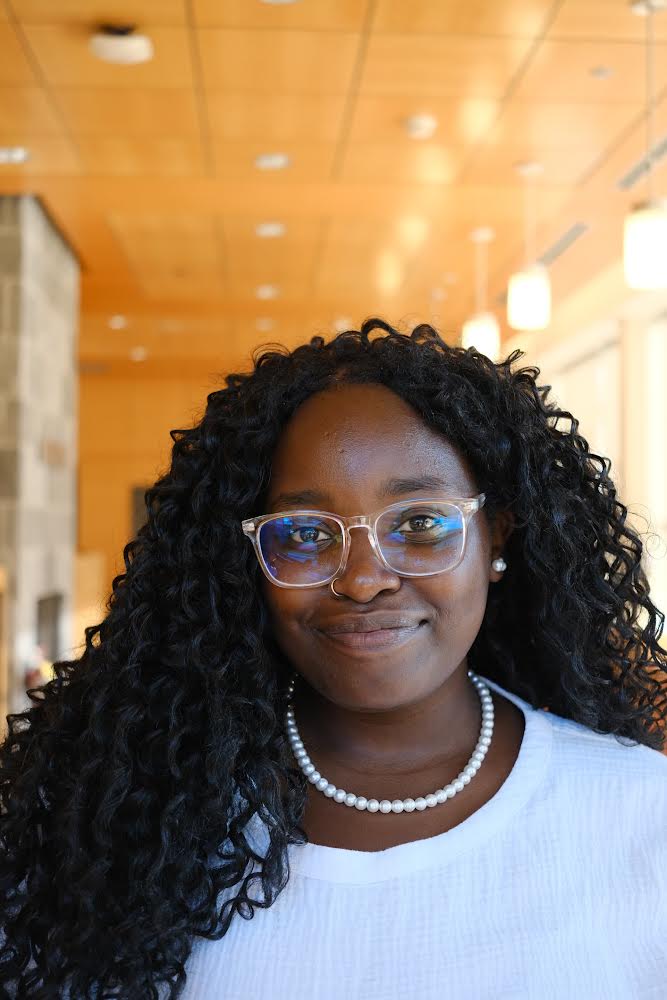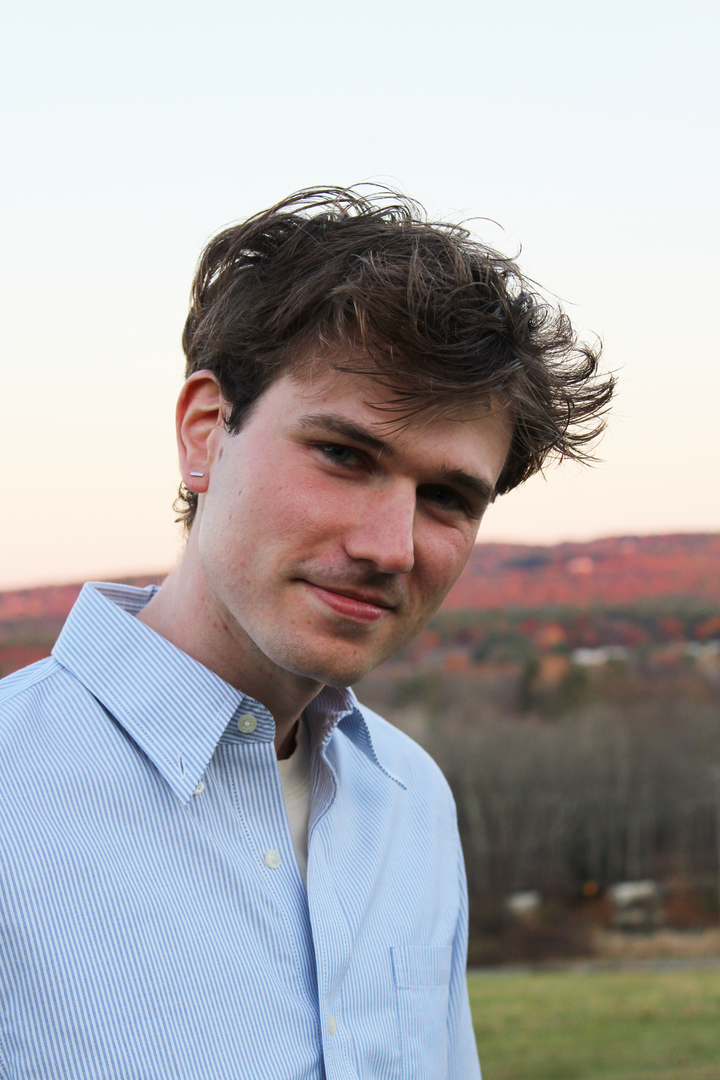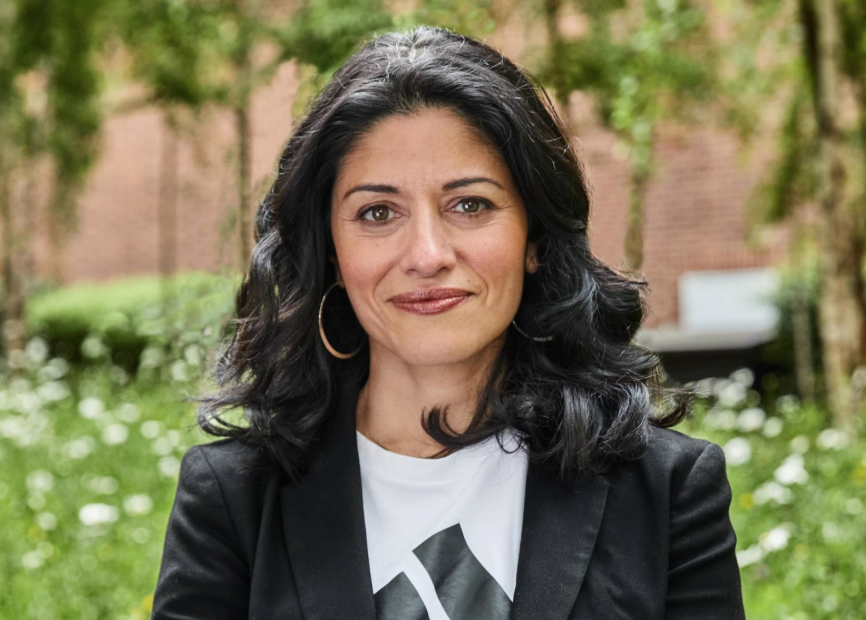Grace Nyanchoka: Classes in an International Context
Be it through her studies in neuroscience, work with the Center for Teaching and Learning and the Office of Sustainability, or dance with the African and Caribbean Student Union, Grace Nyanchoka ’24 has found ways to keep her home country close.

Grace Nyanchoka ’24 describes herself as a “very ‘try once’ type of person’ — a label she’s lived up to throughout her time at Amherst. Over the past four years, Nyanchoka has been involved in the Center for Teaching and Learning, worked to take climate action with the Office of Sustainability, and been both a Community Advisor (CA) and a Diversity Outreach Intern.
As an international student from Kenya, Nyanchoka has also been deeply involved with the Center for International Student Engagement (CISE), African and Caribbean Student Union (ACSU), and ACSU dance — places through which she has found belonging and shared identity on campus.
“Dance is where I got most of my friends.” Nyanchoka said. “It builds a community and relationships — the people that I’m keeping in touch with now and even after graduation are people I met [through ACSU].”
Nyanchoka, who fulfilled the pre-med track, will be graduating with a degree in neuroscience and is planning for a career in healthcare. She spoke of the future with confidence and uncertainty, grateful that Amherst has opened her mind to the possibilities of what being in healthcare entails.
There are many different things Nyanchoka has “tried once” during her time at Amherst. Despite the variety, however, nearly all of them have allowed her to care for or build community for other people. When Nyanchoka described curating care packages for the residents on her floor, she told me that she asks herself:
“How can I make this time memorable for them? What can I do to make their time a little easier?”
From Kenya to Amherst
Although Nyanchoka went to high school in the United States, she grew up in Kenya — an aspect of her identity that has influenced much of her Amherst experience.
“I am always, for one, just thinking about [my family]. How can I still find ways to connect to them or can I do better for them?” Nyanchoka said.
She even finds her home influencing the way she approaches academics — using her country to make her courses meaningful for her.
“When I’m learning or taking classes, I’m always thinking about them in the perspective of what could this look like at home? I’m always looking a lot of my education in the lens of Kenya, and how that information could impact how things are done, which I think makes my classes feel a little bit more involved.”
Nyanchoka’s favorite classes have always been within the Black studies department. “Actually selfishly,” she reflected. “They allow me to learn more about home, my country Kenya and the continent as a whole.”
But when I asked her if she wanted to return to Kenya — where public health is a popular industry — she was hesitant to be too certain about her direction.
“I do realize that a lot of work that I want to do in healthcare would be very impactful at home.” She told me. “It’s something that I’m certainly considering. But at the same time, you never know what happens.”
Whether or not she will return, she still maintains a close connection with her family through what she calls a “long distance relationship.” Nyanchoka has many siblings, all of whom still live in Kenya, and she only can see them once a year.
“Being homesick can get very real.” She admitted.
But, yet again, Nyanchoka still sees the positives despite the frustration of distance: “We talk more and when we do talk, we’re really focusing on catching up with each other and it feels very meaningful.”
An Open Future
One of the things that has shifted the most for Nyanchoka since coming to Amherst has been her perspective on what a career in healthcare looks like. It was only after coming to Amherst that she learned about the public health field and saw that being a doctor wasn’t the only way to go into medicine:
“I think how I view a career, coming from Kenya, and I think this is true for a lot of international students and a lot of other countries outside the US — you’re expected to do well and become a doctor, lawyer, engineer, and it just feels like there’s a very limited [set of things] you can do and if you’re not doing those things, then you’re not successful.”
Speaking with professors, fellow students, and alumni made Nyanchoka realize that she is still not fully sure how she wants to apply her passion for healthcare — but that she’s okay with that.
“I still do have to convince my parents.” Nyanchoka added. “When they hear that I'm considering doing something else other than med school, they panic.”
Nyanchoka has spent her past summers involved in research related to healthcare. Two years ago, she worked at the Kenya Medical Research Institute in an HIV lab — an experience that made her question her original path to become a doctor.
“I felt like I was getting to know more about the community that I’m a part of and the healthcare nuances in Kenya. It was my first exposure to healthcare that was not [being] a medical doctor.”
The next summer she worked in a hematology oncology lab in a U.S. hospital where she researched cancer genetics and got to interact interpersonally with the patients.
The experience was so enjoyable that it reassured her she was on the right path. “I think that’s when I knew that I wanted to stay in healthcare.” Nyanchoka said.
Post-Graduation
As of now, Nyanchoka plans to continue to explore healthcare research after graduation and then, within the next two to three years, consider going back to graduate school.
“I don’t know which grad school — maybe it will be neuro[science] related … or public health related. Maybe then med school at the end of the day.”
Although hesitant to look too far into the future, she remains confident in the directions her interests will take her — her time at Amherst having taught her that “regardless of what you do at Amherst, the door is still open to so many things.”
Outside of her ambitions in healthcare, she hopes to write and travel.
“I want to make sure that I’m fulfilling the simpler joys of life,” Nyanchoka said. “That I’m still taking time to nurture who I am as a person. Find some other interests, whether it’s knitting, writing or something random.”
While it is unknown where exactly she will embark after graduation, Nyanchoka’s success throughout her time at Amherst is evidence enough that her ability to follow her intuition — to try everything at least once — will lead her somewhere meaningful.





Comments ()